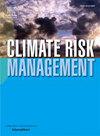Enhancing climate adaptation planning with limited resources: A streamlined framework for municipal climate risk assessments
IF 5
2区 环境科学与生态学
Q1 ENVIRONMENTAL SCIENCES
引用次数: 0
Abstract
Municipalities are key actors in climate adaptation, facing unique vulnerabilities and specific local climate risks. Yet, municipal adaptation planning often remains reactive and incremental, lacking the strategic foundation for long-term resilience.
Local Climate Risk Assessments (CRAs) are critical for identifying and prioritizing adaptation needs, and allocating resources effectively, but their technical complexity and resource demands pose challenges, particularly for municipalities with limited capacities.
We present the “Streamlined Municipal Adaptation Risk Tool for Climate Risk Assessments” (SMART-CRA), a decision-centric framework that operationalizes and adapts the general CRA process of ISO 14091 for municipal contexts. It introduces a heuristic comparative reference approach that builds on an existing national CRA to reduce technical effort while maintaining scientific rigor. This shifts the focus toward participatory evaluations and increases local relevance.
Applied in the German municipality of Geestland, SMART-CRA identified high-priority climate risks across relevant sectors within six months, coordinated by a single key person responsible for managing data collection and stakeholder engagement, demonstrating its feasibility in resource-constrained settings. While designed for broad applicability, successful implementation depends on enabling factors, such as access to high-resolution data, a robust reference CRA, and dedicated personnel, e.g., a climate adaptation manager, which may be less available in developing contexts. Key challenges relate to the inherent limitations of the comparative reference approach, the subjectivity of normative evaluations, and uncertainties in climate projections. To avoid maladaptation and account for uncertainty, contextual judgment and continuous refinement of adaptation strategies over time remain essential.
利用有限资源加强气候适应规划:简化的城市气候风险评估框架
市政当局是适应气候变化的关键行为体,面临着独特的脆弱性和特定的地方气候风险。然而,城市适应规划往往是被动的、渐进式的,缺乏长期抵御能力的战略基础。地方气候风险评估(CRAs)对于确定适应需求并确定优先次序以及有效分配资源至关重要,但其技术复杂性和资源需求带来了挑战,特别是对于能力有限的市政当局。我们提出了“用于气候风险评估的精简城市适应风险工具”(SMART-CRA),这是一个以决策为中心的框架,可针对城市环境实施和调整ISO 14091的一般CRA流程。它引入了一种启发式比较参考方法,该方法建立在现有的国家CRA基础上,以减少技术工作量,同时保持科学的严谨性。这使重点转向参与性评价,并增加地方相关性。SMART-CRA在德国吉斯特兰市应用,在六个月内确定了相关部门的高优先级气候风险,由负责管理数据收集和利益相关者参与的单一关键人员进行协调,证明了其在资源受限环境下的可行性。虽然为广泛适用性而设计,但成功实施取决于有利因素,例如获得高分辨率数据、可靠的参考CRA和专门人员,例如气候适应管理人员,这在发展中国家可能较少。主要挑战涉及比较参考方法的固有局限性、规范性评估的主观性以及气候预测的不确定性。为了避免适应不良和解释不确定性,上下文判断和适应策略的不断改进仍然是必要的。
本文章由计算机程序翻译,如有差异,请以英文原文为准。
求助全文
约1分钟内获得全文
求助全文
来源期刊

Climate Risk Management
Earth and Planetary Sciences-Atmospheric Science
CiteScore
8.20
自引率
4.50%
发文量
76
审稿时长
30 weeks
期刊介绍:
Climate Risk Management publishes original scientific contributions, state-of-the-art reviews and reports of practical experience on the use of knowledge and information regarding the consequences of climate variability and climate change in decision and policy making on climate change responses from the near- to long-term.
The concept of climate risk management refers to activities and methods that are used by individuals, organizations, and institutions to facilitate climate-resilient decision-making. Its objective is to promote sustainable development by maximizing the beneficial impacts of climate change responses and minimizing negative impacts across the full spectrum of geographies and sectors that are potentially affected by the changing climate.
 求助内容:
求助内容: 应助结果提醒方式:
应助结果提醒方式:


